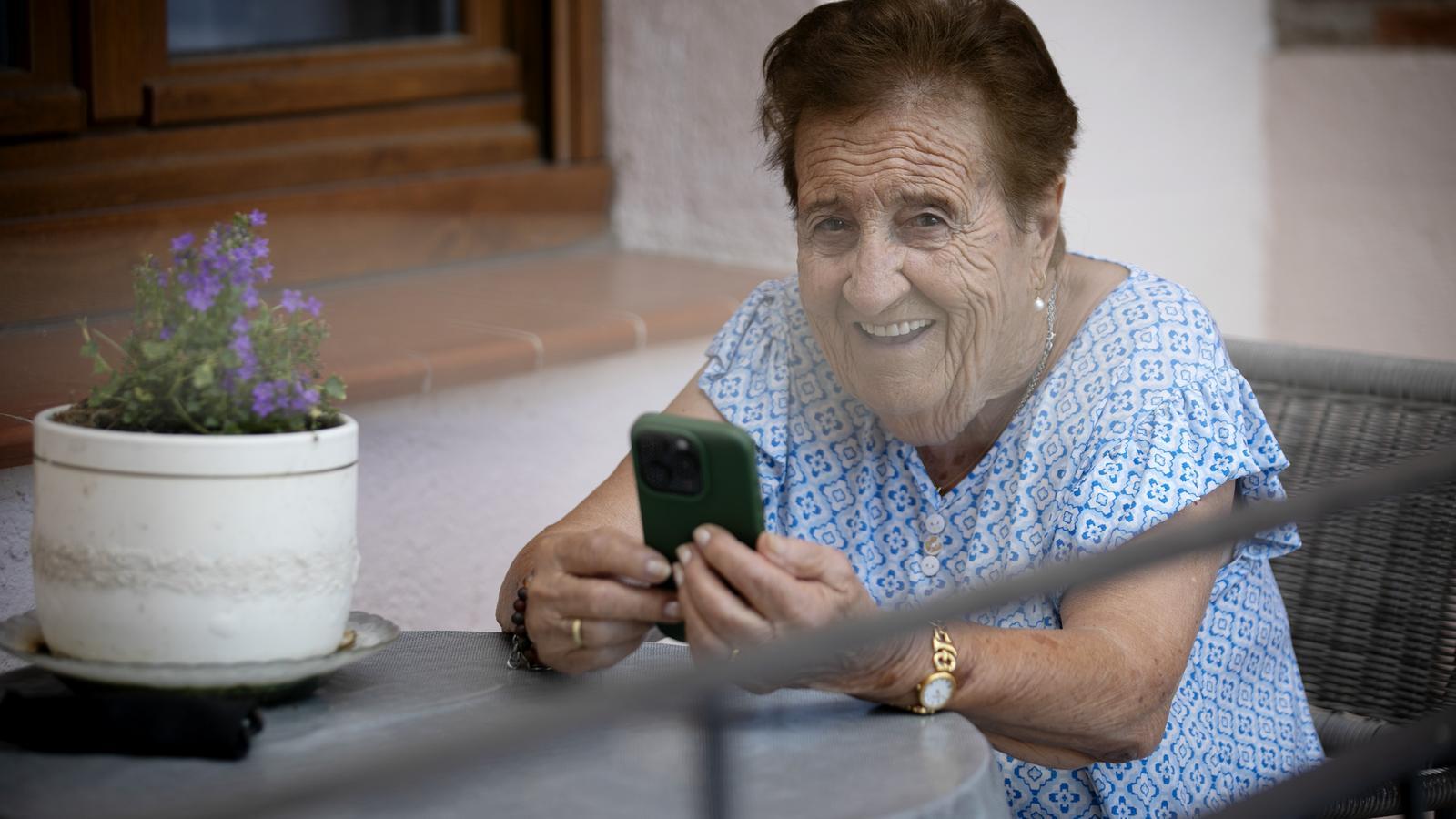Yaya Angeleta, the Instagram-loving grandmother: "We started life with 500 pesetas; we didn't even have water or electricity."
With 145,000 followers on Instagram, she is the largest content creator in Catalonia.


Wheel of TerShe is the oldest Catalan-language content creator with the most followers, with 145,000 on Instagram. Àngela Coromina Roca (Prats de Lluçanès, 1931) has been sharing her life on social media for a couple of years now thanks to her grandson, Jordi Crous, with whom she maintains a close and comical relationship. Iaia Angeleta has become the grandmother of Catalonia for her sincerity, catchy laugh, and because she awakens in many people nostalgic memories of a relative or a bygone world.
She was born in a farmhouse in Prats de Lluçanès. She only attended school from the ages of 8 to 14—in Spanish, of course; she has never learned to write in Catalan—because she had to walk an hour to get there. She remembers the war "as if it were now." "The front passed in front of the house. Around the house they killed many soldiers. The mother locked us in a room and we heard the features. The Nationalists spent three days and two nights trying to enter Prats, which was a bit higher up, because there was resistance. We were left without chickens, without rabbits, they took the mule and the bedclothes. The Nationalists went, the Reds didn't touch anything. We were left completely broke. The children were crying. The house was full of Moors. The mother boiled potatoes and bacon for us," she recalls.
At 20, she married. They went on a three-day honeymoon to Barcelona, where she saw the sea for the first time, and went to live in a small, isolated farmhouse in Santa Maria de Merlès. "With 500 pesetas. We had no water or electricity, and it took two hours to go to the village to buy groceries. We only went every two weeks, along a small path, to get oil, salt, cans of sardines, cod, and four-kilo loaves of bread. We would go and get the water for cooking from the spring, we would wash in the irrigation ditch, and in winter we would put a small pot of water on the fire. At mass, they must have thought we were making a cow stench..." she thinks now.
They raised the chickens, eggs, and rabbits for themselves. "We prospered, but with a lot of work. We bought more cows, we milked them by hand, we got up at five. We didn't have a holiday," she recalls. When her daughter was 14, they saw textile factories as an option so they could have a schedule and a pension, and so they both ended up working at La Azul in Roda de Ter. "I was working piecework, and since I was used to working as a peasant, I was one of those who worked, and as a peasant, I was one of those who worked." The striking woman. Partying on Saturday and Sunday, I felt like I was a queen, and you didn't have to go around so covered in cow or pig shit," she recalls.
Not stopping anything
At 94, she's completely independent: she cooks for herself and her family, hauls firewood up to the house in the winter, walks in the summer, and spends the afternoon doing laundry in the village with her friends at the Congress of Deputies—as they call senior citizens' gatherings—and she still drives. We meet the day she's due to renew her license in Vic. If they don't give her the money, she'd like to buy an electric scooter, "even if it's just to go to the supermarket." Her grandson is making crosses.
She assures us there's no secret to her good health, memory, and drive. "I've never drunk liquor, very little wine, if we're having a party, a small glass of champagne, but I drink a lot of water and Nestea with water. I make my own food, nothing spicy: toasted soup with cauliflower, boiled potatoes with onions, potato omelet, or zucchini." On winter Sundays, she makes herself a hot chocolate. Perhaps this is the trick to overcoming life's obstacles. "Don't stop, don't get stuck. Many days I find myself tired and want to lie down. But I don't; at five or six in the afternoon I grab the chopsticks, go for a walk, and then we sit under a vine," she says.
This whole small, conventional grandmotherly life is the key to her popularity today. Her net worth adds that she has a profile that has no competition. Her success on social media has led to her being invited to all kinds of events, from Cabró Rock to street vendors, meetings, meals with celebrities, television programs, stores, promotions... The latest thing she's done is till a field with a tractor. She doesn't say no to anything, except in the Madrid gossip press. "We don't do it for money; we're interested in having a good time. That's why we don't want to be complacent about the language," Crous argues. "We don't select much; it's a product of improvisation. However, we do get a lot of gifts. We're more famous than we wanted. We wanted to convey that older people aren't a hindrance, because we're a society. You can also take grandma for a walk," he adds.
"I would never have thought of it," Iaia Angeleta confirms. "I don't give it much importance. I am a very simple woman. I say what I think, and I tell the truth. Pilarín [Bayés] is very wise, I am not. She says she doesn't know how she raised the children without knowing how to cook; as peasants we had animals and land, and when the men came to reap or beat the crops, I had fourteen or fifteen to eat and I cooked for everyone alone. I wasn't afraid.
Veal cheek, tongue, a pan of rice or noodles, and snails in a casserole are her signature dishes. Her recipes and her life will become an autobiographical book this year.
